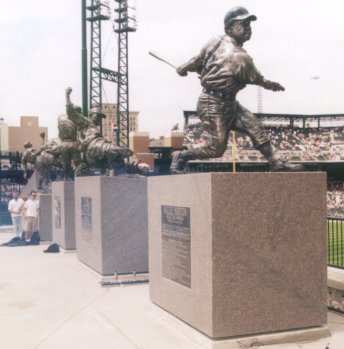
HART PLAZA • AROUND DOWNTOWN • CREDITS

|
| HOME • GRAND CIRCUS PARK • COMERICA PARK • FOOT OF WOODWARD
HART PLAZA • AROUND DOWNTOWN • CREDITS |
Comerica Park has been home to the Detroit Tigers since April 11, 2000, when the Tigers hosted the Seattle Mariners. Fans miss the old Tiger Stadium, but the new field has one advantage: no posts block the view of the field.
Ernie Harwell Sculptor: Lou Cella Photograph: Mike Russel "For lo, the winter is past, the rain is over and gone; the flowers appear on the earth; the time of the singing of birds is come, and the voice of the turtle is heard in our land." When patrons enter Comerica Park, they're greeted not by the image of a player, manager, or coach, but by the play-by-play announcer who ushered in 42 Tigers seasons with these words from the Song of Solomon. Ernie Harwell—broadcaster, author, songwriter, and the only announcer ever traded for a player—earned his place in the hearts of Detroiters for his skill behind the microphone, his charity, and his gentlemanly ways. Harwell has been seen or heard in the films Cobb, One Flew Over the Cuckoo's Nest, and Tiger Town; and the made-for-television movies The Five People You Meet in Heaven and Aunt Mary. Ernie and booth-mate Paul Carey were fired in 1990 as part of a housecleaning by the Tigers' new owner, Domino's magnate Tom Monaghan. Monaghan, who shared the blame with team president Bo Schembechler and flagship station WJR radio, may have known how to sell pizza, but failed to consider the outrage the move would inpire. By 1993, the team had been sold to Monaghan's competitor Mike Ilitch of Little Caesar's, who returned Harwell to the broadcast booth for innings 1-3 and 7-9 of each game. He retired in 2002. Ernie was inducted into the Baseball Hall of Fame in 1981. |

The images of six Tiger greats, created by Omri Amrany, sit behind right field:
|
Hank Greenberg Sculptor: Omri Amrany Photograph: Unknown "Hammerin' Hank" Greenberg played for the Tigers from 1930 to 1946, with a break for service in World War II. His career batting average was .313, with 331 home runs and 1,276 runs batted in. Greenberg was the first Jewish superstar in American sports. Of his decision to refuse to play on Yom Kippur in 1934 (despite the Tigers' contention in a pennant race), poet Edgar A. Guest wrote: "We shall miss him on the infield and shall miss him at the bat / But he's true to his religion—and I honor him for that." |
Willie Horton Sculptor: Omri Amrany Photograph: Unknown Al Kaline and Willie Horton played on the "fabulous come-from-behind Tigers" team (as Ernie Harwell referred to them) of 1968. Down three games to one against the St. Louis Cardinals in the World Series, they rallied to take the remaining three games and the Series behind the pitching of Denny McLain and Mickey Lolich. "Number 6" may signify Patrick McGoohan to the rest of the world. In Detroit, that can only be Al Kaline (left). Kaline's Major League career (1953-1974) is unusual: he played almost exclusively for only one team, spending a rookie season with the Phillies before joining the Tigers. He racked up a batting average of .297, with 3,007 hits and 399 home runs. He was the first Tiger ever to have his uniform number retired, in 1980. Willie "The Wonder" Horton (right) is the youngest of 21 children. He has a lifetime batting average of .273, with 325 home runs, and 1,163 RBIs. In the later years of his career, he was twice named the American League's top designated hitter, and was part of the AL all-star team four times. His number 23 was retired in 2000.
|
"The Georgia Peach." "Genius in Spikes." Tyrus Raymond "Ty" Cobb is widely credited with setting 90 Major League Baseball records during his career, and as of 2009 still holds several, including highest career batting average (.367)—and most career errors (267). Cobb was known for his surly temperament and his aggressive playing style, which the Detroit Free Press described as "daring to the point of dementia." In the Comerica Park display, Cobb is the only player without a number. In his playing days, uniform numbers had not yet been introduced. |
Home • Grand Circus Park • Comerica Park • Foot of Woodward • Hart Plaza • Around Downtown • Credits • Leftovers